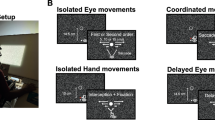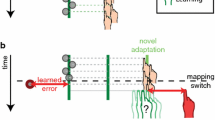Abstract
Pointing movements made with a hidden cursor from the center of gaze to a stationary, visible target overshot the actual target location. The systematic error decreased when the final cursor location from the previous trial was shown, which likely led to the creation of an internal sensorimotor model of movement. However, the putative model had a short memory, and could not substitute for on-line visuomotor feedback on subsequent trials. Contrary to common belief, the effect of a lack of visuomotor feedback was seen even in the early acceleration stage of the movement trajectory. Unchecked in the absence of visual monitoring, the acceleration stage of the movement lasted longer, as was evidenced by the significantly larger value of the peak cursor speed. Moreover, the speed peaked much later in the course of the movement. Speed declined more rapidly thereafter. Consequently, the delayed deceleration stage lasted far less than the acceleration stage. In the absence of visual feedback, the shift rightward in time of the peak speed position (PSP) in relation to total movement duration and other changes in the trajectory imply that visual feedback must play a significant role in determining when acceleration ceases (dV/dt=0), and argue against the traditional notion that visuomotor feedback is unavailable until the later stages of movement. Moreover, our data suggest that non-visual modalities, e.g., proprioception, may be too slow to make up for the absence of vision.
Similar content being viewed by others
Author information
Authors and Affiliations
Corresponding author
Rights and permissions
About this article
Cite this article
Sheth, B.R., Shimojo, S. How the lack of visuomotor feedback affects even the early stages of goal-directed pointing movements. Exp Brain Res 143, 181–190 (2002). https://doi.org/10.1007/s00221-001-0977-5
Received:
Accepted:
Published:
Issue Date:
DOI: https://doi.org/10.1007/s00221-001-0977-5




